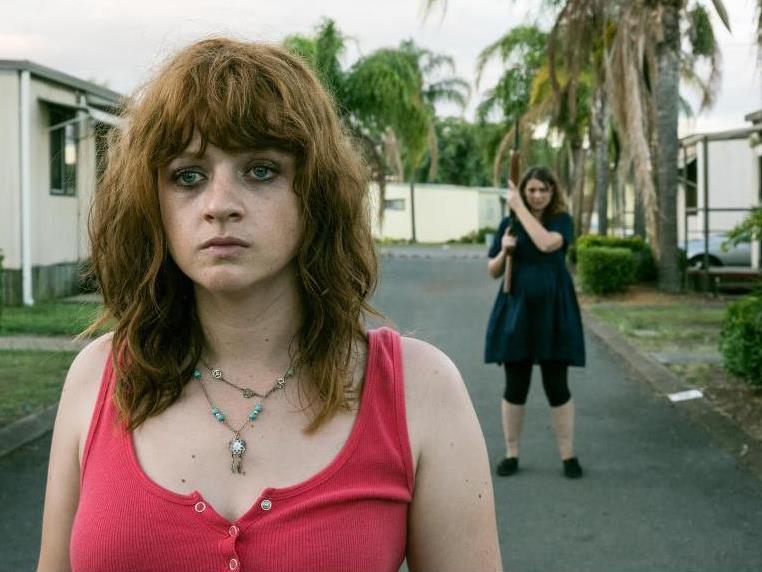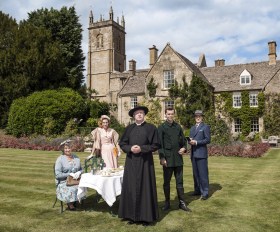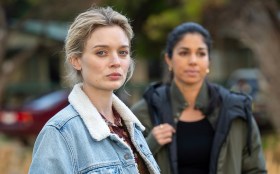Sara West in Don’t Tell.
Money may talk, but it can also mute. Indeed, when accounts of child abuse are levelled at religious institutions, throwing cash at the problem has often secured silence. Lyndal (Sara West, Bad Girl) doesn’t opt for a windfall, however. She won’t. She can’t. Aged 22 in the 2001-set Don’t Tell, she’s haunted by the treatment she was forced to endure a decade earlier, when she was an eager student (Kiara Freeman, Pirates of the Caribbean: Dead Men Tell No Tales) sent to board at the Anglican Church’s Toowoomba Preparatory School. There, housemaster Kevin Guy (Gyton Grantley, TV’s House Husbands) waged a campaign of sexual molestation that tore her life apart.
In her debut feature after amassing a sizeable array of television credits (SLiDE and Wentworth among them), director Tori Garrett relays the battle for justice that springs when Lyndal wants her story known – and wants those responsible to be brought to account. Based on the non-fiction book by Stephen Roche, her lawyer, who’s played on-screen by Aden Young (Rectify), the film recounts her quest to be heard against an institution eager to keep her voice quiet. As a child, she was told not to speak up by her abuser. As an adult, as she starts to unburden herself of her ordeal, what begins as a whisper rises to a scream.
Screenwriters Anne Brooksbank (Heatstroke), Ursula Cleary (The Time of Our Lives) and James Greville (Garrett’s previous short The Barrows) juggle competing concerns, including Lyndal’s reunion with her worried mother (Susie Porter, Hounds of Love) and stoic father (Martin Sacks, Brock), flashbacks to her time at school, Roche’s professional struggles, and the resulting court case, where barrister Bob Myers (Jack Thompson, The Light Between Oceans) takes the helm. Still, there’s no doubting where the film’s focus truly resides, or where its strengths arise either. Don’t Tell is at its best when it’s honing in on the heavy toll of Lyndal’s experiences, whether dissecting the considerable pressure mounted against victims in such circumstances, exposing how she’s treated then and now, tallying the difficulties that come with breaking her silence, or conveying the deep-seeded pain that echoes through her modern-day existence.
In fact, Don’t Tell’s fates are as firmly entwined with its leading lady as they are with the real-life story at its core – and, where the latter is sometimes handled with bluntness and packaged with neat dialogue, the former offers a masterclass in making an impact. Though surrounded by a hefty lineup of veteran Australian talent doing solid work, with Rachel Griffiths (The Osiris Child: Science Fiction Volume One) and Jacqueline McKenzie (Force of Destiny) also among the cast, West bristles against the extremes of fragility and determination, balancing conflicting feelings in what proves a compelling, film-stealing portrayal. To put it simply, she ensures that Lyndal’s pain, and her mission, remain raw, resonant, and real.
West’s efforts are certainly needed, as is Garrett’s sensitive direction. It’s a credit to the first-time filmmaker that the end result seems built from familiar parts but never appears formulaic or routine, even when painting church leaders as clear villains or literally interrogating the case in the courtroom. Similarly, her ability to make individual images sear themselves into memory can’t be underestimated, particularly as cinematographer Mark Wareham (Jasper Jones) peers probingly at scenes seething with emotion. Don’t Tell wouldn’t dream of imploring anyone to keep quiet, but, in making plain the importance of speaking up, it also knows when to let its visuals do the talking.
Rating: 3 1/2 stars out of 5
Don’t Tell
Director: Tori Garrett
Australia, 2017, 110 mins
Release date: May 18
Distributor: Fornillo Road
Rated: M
Actors:
Director:
Format:
Country:
Release:





